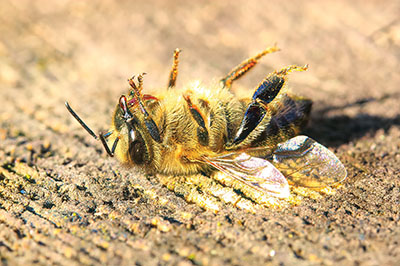
Silence is a powerful thing. I was on my way to the compost bin when I noticed an enormous mound of dead bees in front of my strongest hive. No buzz issued from the landing board. No industrious thrum from above. The absence of sound shattered the morning.
I was dumbstruck. When I opened that hive on the previous day, bees boiled from the top. Beneath them, rows of glistening cells demanded a second honey super. The colony had overwintered without a hitch and was looking like a winner. But that was yesterday.
Today the colony was dead. Except for multiple frames of brood, some of it emerging as I watched, virtually no bees were left. Although most were on the ground with tongues extended, many had fallen between the frames, their lifeless bodies blocking the entrance. was dumbstruck. When I opened that hive on the previous day, bees boiled from the top. Beneath them, rows of glistening cells demanded a second honey super. The colony had overwintered without a hitch and was looking like a winner. But that was yesterday.
I didn’t need to look further because I had witnessed this haunting scene before. Here today, gone tomorrow. Like the 50,000 bumble bees in an Oregon parking lot, my bees were destroyed by the careless application of pesticide.
The bees in the adjacent hive hadn’t a care in the world, or so it seemed. They came and went, darting into the sky and disappearing from view. Others jammed the entrance, heavy with pollen and purpose. Little did I know they were next.
Assigning Blame
When people complain about “the pesticide problem,” they often point to Big Ag. It’s easy to fault large corporate farms because they are, well, large and corporate. And because they are in a nebulous “other place,” it’s easy and comfortable to assign blame. While it’s true that many modern farms use an enormous amount of pesticide—probably way too much—they don’t have a corner on pesticide use. Not by a long shot. In fact, if pesticides were kept on the farm, my bees wouldn’t be dead.
I live in a rural area dominated by forest. Here, enormous trees like Douglas fir, western red cedar, and big-leaf maple grow like weeds. No farms dot the landscape. No animals graze in planted fields. Instead, most land that isn’t in trees is zoned rural residential.
The person who wiped out my bees was not a farmer but most likely a homeowner, someone who noticed bugs—maybe even bees—on a flowering tree or shrub and decided to “take care” of them. Most people have no idea that a plant in flower shouldn’t be sprayed, or why. Most have no idea that harm may come from their actions.
Home Pesticide Use
Not much has changed in the last 30 years. Way back in 1989 I wrote an editorial about home pesticide use for the newspaper where I worked. At the time, much controversy surrounded government spraying for the Mexican fruit fly in southern California. Although the city gave plenty of advance notice and did all their spraying at night, people were worried. While I understood their concern, I felt that the pesticide abuse I saw all around me was a bigger problem.
Not a week earlier I had watched a women at the newspaper office empty an entire can of flying insect killer on a hapless spider. The rest of us were left to breathe the fumes and clean the greasy spot from the baseboard. Meanwhile, not being an insect nor capable of flight, the spider sidled off, damp and annoyed.
To me, the women’s actions represented the difference between knowledgeable agricultural use of pesticides and emotional, irrational use of pesticides by people who don’t understand their power. The woman injected all those chemicals into our environment, not caring what else might be injured. She didn’t bother to see if it was the right formula for the job. She didn’t consider collateral damage to her officemates. She didn’t measure the amount, and she didn’t figure her costs—a few dollars to inconvenience one spider is ludicrous.
And please don’t think I’m picking on women. I’ve watched my neighbor carelessly spray his fence line while his two preschool children played beside him, breathing the fog. The girl ate a candy bar while the boy shot a plastic dart into the pesticide-soaked grass, retrieving it again and again. The dad probably thought the stuff was harmless, and maybe it was. But do you really want to test that theory on your kids?
Pesticides are Expensive
Conversely, growers who use pesticide have a completely different mindset. If they don’t consider their costs, they won’t be able to stay in business. Not only are pesticides expensive to buy, but so is the equipment used to spray them, and the help hired to apply them.
Because the expense is great, growers are careful to identify what they are trying to kill. In an effort to control costs, they use the recommended rate of application, the optimum timing, and the proper method of distribution. It is easy to forget that farmers have a tremendous financial incentive to use as much as
….


